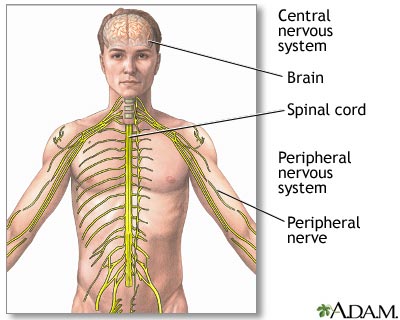Symptoms & Signs
Symptoms usually do not develop until after age 50. Persons with ALS have a loss of muscle strength and coordination that eventually gets worse. This eventually makes one unable to do routine tasks such as going up steps, getting out of a chair, or swallowing.

Breathing or swallowing muscles may be the first muscles affected. As the disease gets worse, more muscle groups develop problems.
ALS does not affect the senses (sight, smell, taste, hearing, touch), bladder or bowel function, or a person’s ability to think or reason.
Symptoms include:
* Difficulty breathing
* Difficulty swallowing
o Gagging
o Chokes easily
* Head drop due to weak spinal and neck muscles
* Muscle cramps
* Muscle weakness that slowly gets worse
o Commonly involves one part of the body first, such as the arm or hand
o Eventually leads to difficulty lifting, climbing stairs, and walking
* Paralysis
* Speech problems, such as a slow or abnormal speech pattern
* Voice changes, hoarseness
Additional symptoms that may be associated with this disease:
* Drooling
* Muscle contractions
* Muscle spasms
* Ankle, feet, and leg swelling
* Weight loss
Diagnosis & Tests
An exam of the nerves and muscles shows weakness, often beginning in one area. There may be muscle tremors, spasms, twitching, or loss of muscle tissue (atrophy). Atrophy and twitching of the tongue are common.
The person’s walk may be stiff or clumsy. Reflexes may be abnormal and may include loss of the gag reflex. Some patients have trouble controlling crying or laughing. This is sometimes called “emotional incontinence.”
Tests that may be done include:
* Blood tests to rule out other conditions
* Breathing test to see if lung muscles are affected
* EMG to see which nerves do not work properly
* Genetic testing, if there is a family history of ALS
* Head CT or MRI of head to rule out other conditions
* Swallowing studies
* Spinal tap (lumbar puncture)
Amyotrophic lateral sclerosis: Overview, Causes
Amyotrophic lateral sclerosis: Symptoms & Signs, Diagnosis & Tests
Amyotrophic lateral sclerosis: Treatment
Reviewed By : Daniel B. Hoch, PhD, MD, Assistant Professor of Neurology, Harvard Medical School, Department of Neurology, Massachusetts General Hospital. Also reviewed by David Zieve, MD, MHA, Medical Director, A.D.A.M., Inc.
